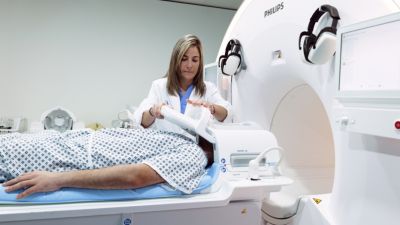Magnetic Resonance Imaging (MRI) has undergone a transformative evolution over the past 15 years, driven by advancements in MRI technology that prioritize patient comfort, workflow efficiency, and superior image quality. Philips’ latest innovations, such as wider bores, lighter coils, and AI-driven tools like SmartSpeed and Smart Workflow, are redefining the magnetic resonance imaging experience. These upgrades not only improve diagnostic confidence—especially in imaging soft tissues—but also address common patient concerns, such as fear and long scan times.

For healthcare providers, the integration of AI and automation has streamlined workflows, reducing setup times and enabling up to 80% [1] of procedures to start with a single click. This efficiency allows hospitals like Hospital Nuestra Señora del Rosario in Madrid to handle higher patient volumes with frequent imaging without compromising time opportunity. Technicians, including Senior Technician Rocío Muñoz, report significant time savings—from 20-30 minutes per MRI examination to just 15 minutes—thanks to accelerated 3D sequences and automated positioning.
The shift from traditional MRI 2D scans to high-resolution 3D image acquisition, powered by SmartSpeed, provides sharper, more consistent results, aiding clinicians in making first-time-right diagnoses. Additionally, features like ScanWise Implant [2] and VitalEye further enhance patient outcomes by accounting for magnetic properties and local magnetic field interactions, improving comfort and reducing motion artifacts. This article and video explore how Philips’ MRI upgrades are shaping the future of magnetic resonance imaging, enhancing patient experiences and clinical outcomes at Hospital Nuestra Señora del Rosario in Madrid.
The evolution of MRI has placed a strong emphasis on improving the patient experience. One of the most notable advancements is the introduction of a 70 cm bore, which provides more space and reduces feelings of confinement, particularly for patients with claustrophobia or larger body types. Thicker, more comfortable mattresses and lighter coils further contribute to a relaxed environment, helping patients remain still during scans—a critical factor for achieving high temporal resolution and clear images.
AI-powered tools like SmartSpeed and SmartWorkflow are transforming MRI by significantly reducing exam times and scan times while maintaining or improving image quality through advanced deep learning reconstruction techniques. SmartSpeed, Philips’ advanced AI acceleration technology, uses deep learning algorithms to reconstruct MRI data rapidly, allowing for high-resolution 3D imaging from shorter scan data and lowering the impact of patient movement. In practice, SmartSpeed AI can cut scan duration by up to 65% [3], facilitating the shift from multiple 2D scans to a single, contrast enhanced MRI 3D scan. This shift provides clinicians with comprehensive diagnostic information in less time. Rocío Muñoz highlights the impact: “Now we do a lot of 3D sequences with very short scan times,” underscoring the efficiency gains.
SmartWorkflow, on the other hand, uses AI to automate tasks for patient positioning and coil combination, significantly reducing setup time. With up to 80% [1] of procedures starting with just one click, hospitals can process more patients daily focusing on the patient and not on the mechanical task. “Before, studies took 20-30 minutes; now we’ve reduced it to 15 minutes,” notes Rocío, demonstrating the tangible benefits of these upgrades. For patients who have metal implants, features such as ScanWise Implant play a crucial role in simplifying the scanning process. This technology provides procedure that is both reliable and efficient for everyone involved. When you combine these specialized tools with broader advancements in the field, such as automated protocols and lightweight coils, MRI exams become much more accessible. These innovations help cater to the diverse needs of patients, making their experience more comfortable and reassuring.
The SmartPath portfolio is designed to help healthcare providers upgrade and modernize their existing magnet efficiently. Importantly, SmartPath solutions are available for the entire Ingenia family of MRI scanners, supporting a range of magnetic field strengths—including 1.5T and 3.0T systems. This flexibility provdes that facilities can benefit from the latest advancements in MR imaging, such as improved workflow, enhanced image reconstruction, and greater patient comfort. By leveraging SmartPath, institutions like Nuestra Señora del Rosario in Madrid can extend the lifetime of their Ingenia scanners and maintain cutting-edge diagnostic capabilities while managing downtime and costs, without the need for complete system replacement.
Automation and AI have streamlined MRI workflows, increasing speed and efficiency. SmartExam [2] enables one-click automated planning, scanning, and processing, while VitalEye improves setup and monitoring. These tools enhance consistency and diagnostic reproducibility across staff and patients. With the integration of these technologies, MRI teams can reduce manual intervention, resulting in fewer errors and less variability between scans conducted by different technicians. Automated features such as SmartExam not only accelerate the exam process but also help standardize results, making it easier to compare images over time or between facilities. VitalEye’s advanced monitoring can detect subtle changes in patient positioning or movement, providign optimal image resolution and reducing the need for repeat scans caused by motion artifacts. As a result, both clinicians and patients benefit from a smoother workflow, shorter appointment times, and more reliable diagnoses, ultimately supporting better patient care and operational outcomes in medical imaging departments.
Ongoing MRI advances are shaping the future of Magnetic Resonance Imaging. Philips’ SmartPath portfolio help hospitals access advanced technology, enhancing image quality, patient comfort, and efficiency. By modernizing existing MRI systems with SmartPath, healthcare providers benefit from the latest innovations without full system replacement, managing costs effectively. Features include enhanced software algorithms for sharper images, faster workflows, and improved hardware for better patient experience and reliability. These improvements make MRI scans quicker, more accurate, and more comfortable, supporting clinicians in delivering better patient outcomes through earlier and more precise diagnoses.
We have seen MRI evolve from digital imaging to today's intelligent workflow. The most significant changes are the improved image quality and the combination of coils, making our daily work much easier.

Step into the future with Philips’ MRI innovations
